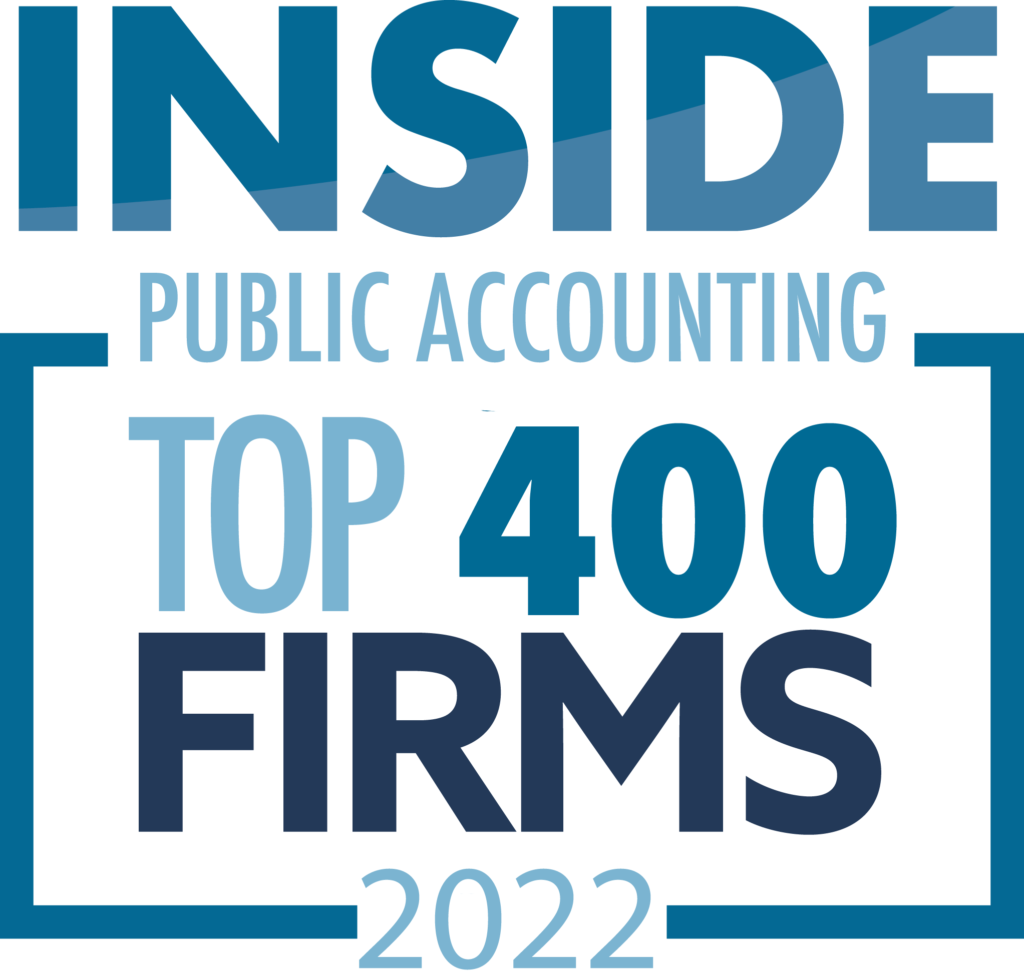
One of the most important questions you face when changing jobs is what to do with the money in your 401(k) because making the wrong move could cost you thousands of dollars or more in taxes and lower returns.
Continue reading
One of the most important questions you face when changing jobs is what to do with the money in your 401(k) because making the wrong move could cost you thousands of dollars or more in taxes and lower returns.
Continue reading
We are pleased to announce that INSIDE Public Accounting (IPA) has named Wheeler Accountants as one of their top 400 firms of 2022.
Each year, IPA surveys the most extensive list of North American public accounting firms – from the multi-billion dollar to the $3.8 million firm – and ranks them. These rankings are determined by IPA’s annual practice management survey and analysis of firms.
Wheeler is honored to have been ranked as a top firm multiple times by INSIDE Public Accounting, and accepts this recognition with great pride.


We are pleased to announce that two WCPA weddings took place this summer!
Congratulations to Anh Diep and her husband Quang Vuong (pictured left), who were married on May 8th, and to Sonia and her husband Nick Silvestri (right), who were married on July 9th in San Juan Bautista.
We wish both couples the very best in their happy years to come!
Wheeler is proud to announce that Alex Baron has been selected to go to Nottingham, England for the UK Secondment Program. Alex was selected to represent our firm because of her outstanding performance over the last three years and her commitment to completing her CPA license as a staff accountant. Alex will be going to the UK near the end of September and will be returning in late November or early December. She will be working on a variety of different projects including audit and tax.
We are also excited to have a Senior from the UK firm Page Kirk joining us around the same timeframe. This is the first time Wheeler has participated in a program of this type and we are committed to making it a success so we can continue to offer these opportunities to our employees on an annual basis.
This quarter’s employee spotlight is shared by senior accountant Kevin Huang and administrative assistant Stephen Pesantes. Both Kevin and Stephen went above and beyond this quarter.
Kevin has achieved incredibly fast turnaround times on his work this year. He is a quick learner, and has a precise sense of what data is important when sorting through client information – a valuable skill in accounting! Kevin also assisted with the JG&A merger, checked in regularly with his team members and clients, and saw many new projects through to completion.
Stephen is the sole admin who handles the firm’s e-Filing. That means before every tax return the firm processes can be filed, the e-File Authorization Forms go through Stephen first. That’s a lot of forms! Despite this immense responsibility, Stephen is highly efficient and still makes time to assist his fellow admin with their tasks, provide training and reach out to clients. He is an enthusiastic team player.
A big congratulations to Kevin & Stephen for being selected as this quarter’s Employees of the Quarter!
Although the tax return filing deadline has come and gone, it’s never too early to start planning for next year’s tax return. With that in mind, let’s take a look at some common summertime situations that could affect your taxes:
Getting married. Getting married this summer? Be sure to report any name changes to the Social Security Administration (SSA). Taxpayers should also report address changes to the United States Postal Service, employers, and the IRS. To report a change of address for federal tax purposes, taxpayers must complete Form 8822, Change of Address and submit it to the IRS. This will help make sure they receive the documents they will need to file their taxes.
Sending kids to summer day camp. The cost of sending your children to a summer day camp may count towards the child and dependent care credit (see above for more details on this credit). Overnight camps do not qualify, however.
Working part-time. While summertime and part-time workers may not earn enough to owe federal income tax, they should remember to file a return. They’ll need to file early next year to get a refund for taxes withheld from their checks this year.
Gig economy work. Summer income earned by providing on-demand work, services, or goods, often through a digital platform like an app or website, is taxable income. Examples of gig work include ride-sharing, delivery services, and other activities. Please call the office to learn more about how participating in the gig economy can affect taxes.
Typically, employees receive a Form W-2, Wage and Tax Statement, from their employer to account for the summer’s work. Taxpayers use this information when filing their tax returns, and they should receive the W-2 by January 31 next year. Employees will get a W-2 even if they no longer work for the summertime employer.
Keep in mind that employers determine whether the people who work for them are employees or independent contractors. Independent contractors aren’t subject to withholding, making them responsible for paying their own income taxes plus Social Security and Medicare taxes.
Adjust Withholding Now To Avoid Tax Surprises Next Year
Life events like marriage, divorce, having a child, or a change in income can affect taxes. Taxpayers should remember that, if needed, they should submit their new W-4 to their employer, not the IRS. Taxpayers can avoid a tax surprise next filing season by using the IRS Tax Withholding Estimator to assess their income tax, credits, adjustments, and deductions. The tool helps taxpayers determine whether they need to change their withholding by submitting a new Form W-4, Employee’s Withholding Allowance Certificate.
Please contact the office if you have any questions or concerns about this topic. Help is just a phone call away.
San Jose: (408) 252-1800
Watsonville: (831) 726-8500
A hobby is any activity that a person pursues because they enjoy it and with no intention of making a profit. People have all kinds of hobbies, from collecting stamps and woodworking to crafting and quilting. In contrast, people operate a business with the intention of making a profit.
Sometimes, people engage in hobby activities that turn into a source of income. For instance, many people may have started making handmade items and selling them for a profit during the pandemic. While most hobbies will never turn a profit, taxpayers should be aware that income earned from hobbies must be reported on their tax returns.
Determining whether a hobby has grown into a business can be confusing, however. As such, taxpayers should know about the nine factors used by the IRS that they must consider when determining whether their activity is a business or hobby:
Reporting Hobby Income
All factors, facts, and circumstances with respect to the activity must be considered. And, no one factor is more important than another. If a taxpayer receives income from an activity with no intention of making a profit, they must report any income on their Form 1040.
Don’t hesitate to call the office with any questions or concerns about whether your hobby qualifies for a business.
San Jose: (408) 252-1800
Watsonville: (831) 726-8500
The optional standard mileage rate, which taxpayers may use to calculate the deductible costs of operating an automobile for business and certain other purposes, increases to 62.5 cents per mile, effective July 1, 2022. The new mileage rate is up 4 cents from the rate effective at the start of the year.
The optional business standard mileage rate is used to compute the deductible costs of operating an automobile for business use in lieu of tracking actual costs. This rate is also used as a benchmark by the federal government and many businesses to reimburse their employees for mileage. Taxpayers always have the option of calculating the actual costs of using their vehicle rather than using the standard mileage rates.
The rate for deductible medical or moving expenses (available for active-duty members of the military) increases for the remainder of 2022 as well, to 22 cents per mile. This new rate is up 4 cents from the rate effective at the start of 2022.
Taxpayers should note that the 14 cents per mile rate for charitable organizations remains unchanged as it is set by statute.
Normally, the IRS updates the mileage rates once a year, generally in the fall, for the next calendar year. As a reminder, for travel from January 1 through June 30, 2022, taxpayers should use the current mileage rates (58.5 cents per business mile and 18 cents per medical and moving – military members only).
The rate increases are a special adjustment for the final months of 2022 in response to recent gasoline price increases. While fuel costs are a significant factor in the mileage figure, other items enter into the calculation of mileage rates, such as depreciation and insurance, and other fixed and variable costs. Midyear increases in the optional mileage rates are rare. The last time the IRS made such an increase was in 2011.

If you’re self-employed and use your car for business, you can deduct certain business-related car expenses. The first thing small business owners need to know is that there are two options for claiming deductions:
Continue reading
Home equity represents a significant portion of the average retiree’s wealth. If you’re 62 or older and house-rich but cash-poor, a reverse mortgage loan allows you to convert part of the equity in your home into cash – without having to sell your home. You can use this cash to finance a home improvement, pay off your current mortgage, supplement your retirement income, or pay for healthcare expenses. A reverse mortgage is not without risk, however.
Continue reading